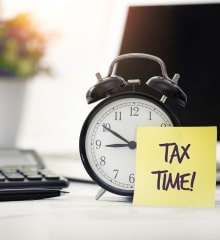5 Steps to Get Out of Debt
Did you make any New Year's resolutions about getting a handle on your finances, saving more money or finally getting out of debt?
Paying off debt is a worthy goal because mounting debt can cause significant stress, which is one of the leading causes of many health
conditions. If you'd like to be happier and healthier, then focus on paying down your debt and watch how much better you'll start to feel.
The average American household is carrying a staggering amount of debt. According to the
Federal Reserve, the average indebted
household debt in October 2014 was $15,611.
Here are five steps you can take towards eliminating debt in your life and moving closer to financial freedom in 2015:
1. Find out where you stand
Start by pulling out all of your bills and totaling them up. Create a spreadsheet where you can track each creditor,
how much you owe them, the interest rate and the payoff amount. Then you can start paying either the minimum payment
for all of your bills and choose the account with the lowest balance, paying a bit extra towards each month until you
have paid it off. Another option is to choose the account with the highest interest rate and focus on getting that one
paid off sooner. When you have paid off one account, take the money you had been paying and apply it to the next account.
There are debt calculators that can tell you how long it will take you to pay off your debt based on the interest rate.
Just getting clarity on where you stand and exactly what you are up against helps you figure out what solutions make
the most sense for you.
2. Create a budget
A budget is an important tool in managing your money.
A budget shows you how you spend the money you make. It can help you prioritize
your spending, and it lets you see where you might want to spend a bit less in one area than you are spending now. To create a budget,
you simply list all of your income and then list all of your monthly expenses item by item. It can be helpful to keep a daily spending
log to get a clear perspective on how much you spend on a daily and weekly basis. There are several free smartphone apps that will help
you track your daily spending.
3. Spend less
Since overspending is most likely what got you into debt in the first place, this is a good place to focus your attention. Here are a few tips
to help you spend less money each month to allow you to put the money you save towards debt repayment:
- Plant a garden
- Make coffee at home
- Plan your meals and make a corresponding shopping list
- Use coupons in the grocery store
|
- Pack your own lunches
- Eat meals at home rather than dining out
- Cancel cable
- Find a cheaper mobile phone plan
- Give up smoking
|
4. Earn more
Don't be fooled into thinking that more money is the key to solving your problems because it is not. Earning more money will only help
you if you develop better money management habits. Here are a few ideas for ways you can bring in some extra cash for paying down your debt:
- Take on extra hours at work
- Find a better-paying job
- Use your skills to take on freelance work on the side
|
- Teach classes (live or online)
- Sell your unused property in a yard sale
- Make items to sell online
|
5. Downsize your lifestyle
If you want to take some drastic steps to lower your cost of living so that you can get back on track financially, try these tips:
- Sell your car
- Get a smaller apartment or downsize your house
|
- Rent out an unused guest room
- Eliminate all unnecessary spending
|
Take action on one or two of these tips. Imagine how satisfying it will feel next year when you look back and see the
progress you made towards eliminating debt. If you maintain these new habits going forward, then once you have paid
off that final account you don't have to worry about finding yourself in debt ever again.
If you have the goal of being debt-free in the New Year, bankruptcy can help make your vision a reality. Contact
DebtStoppers today to schedule a free personal debt consultation with one of our bankruptcy attorneys.


